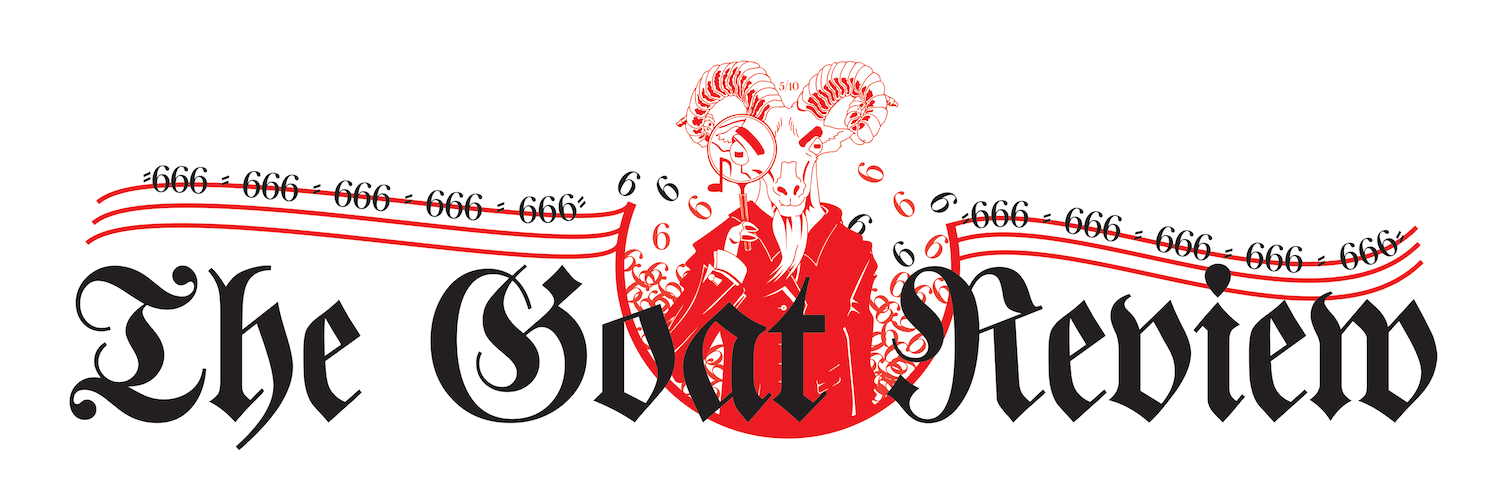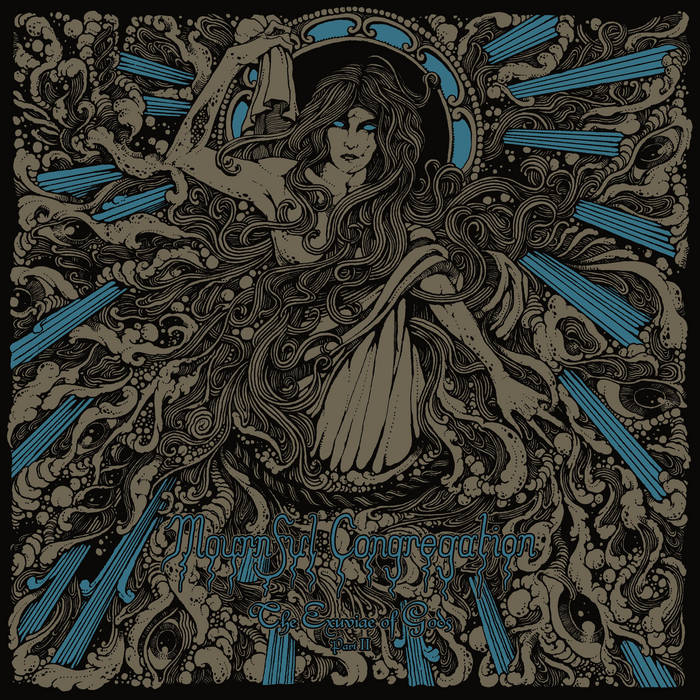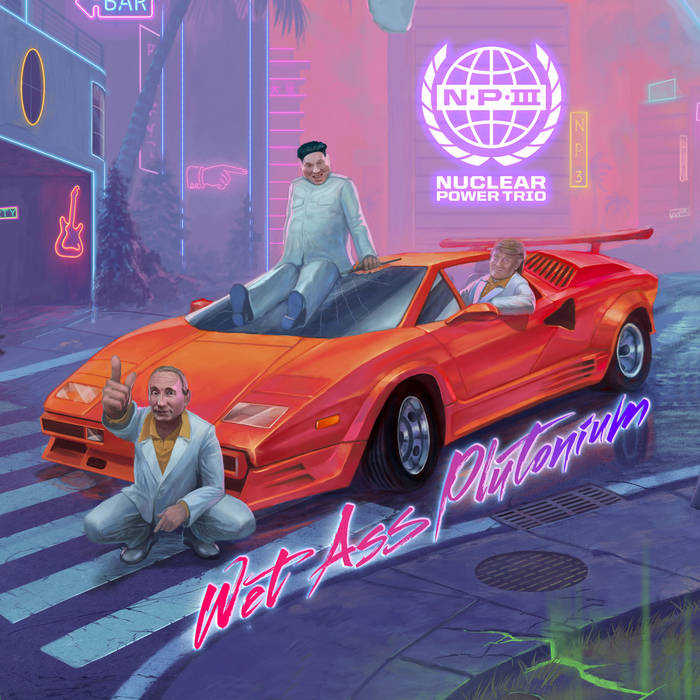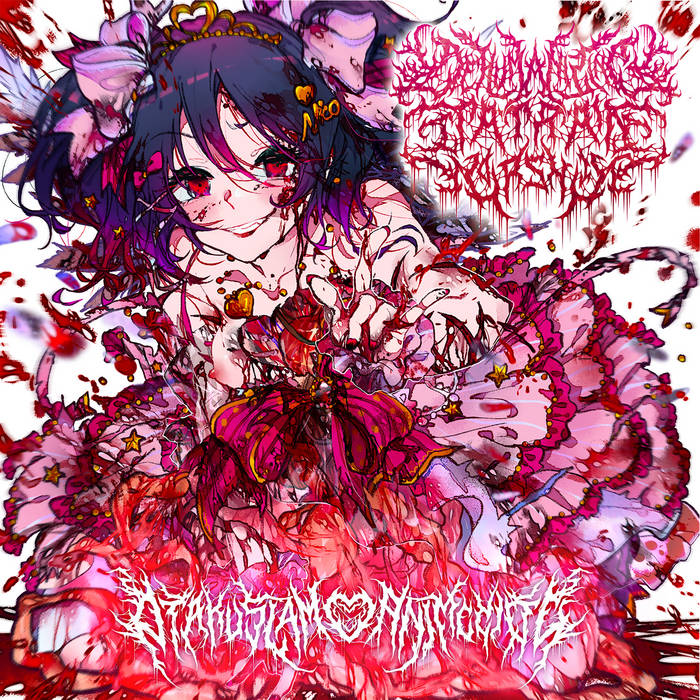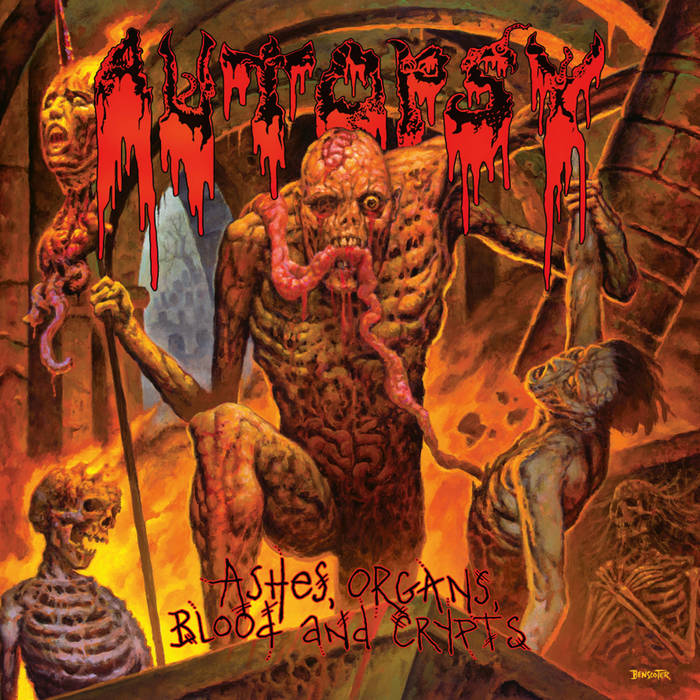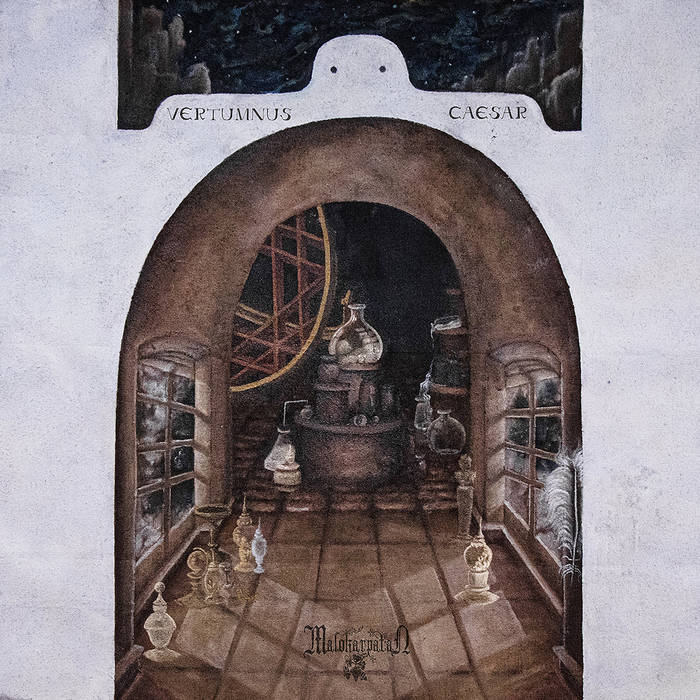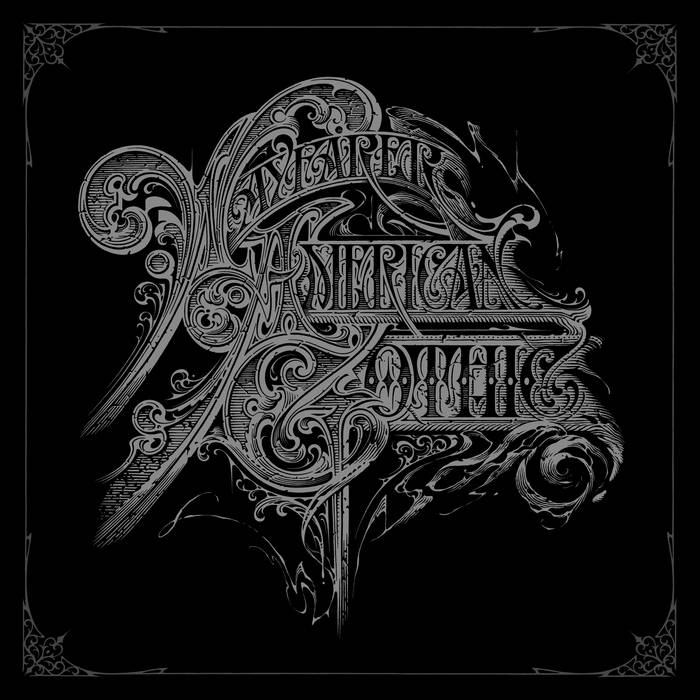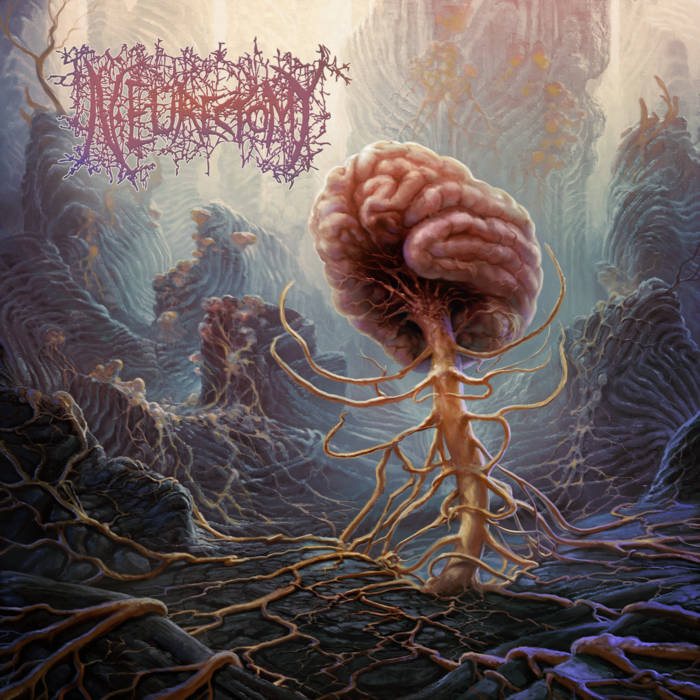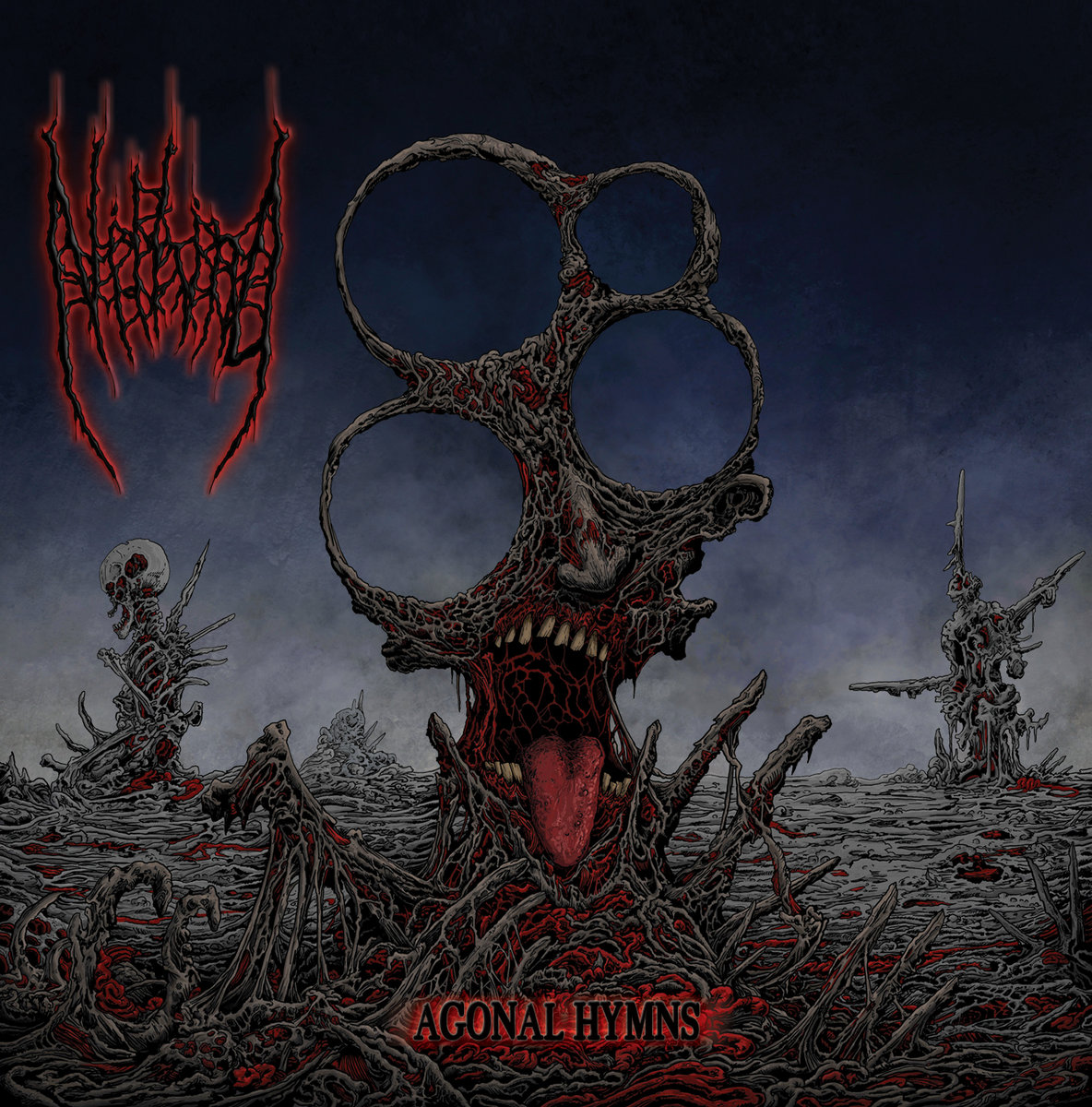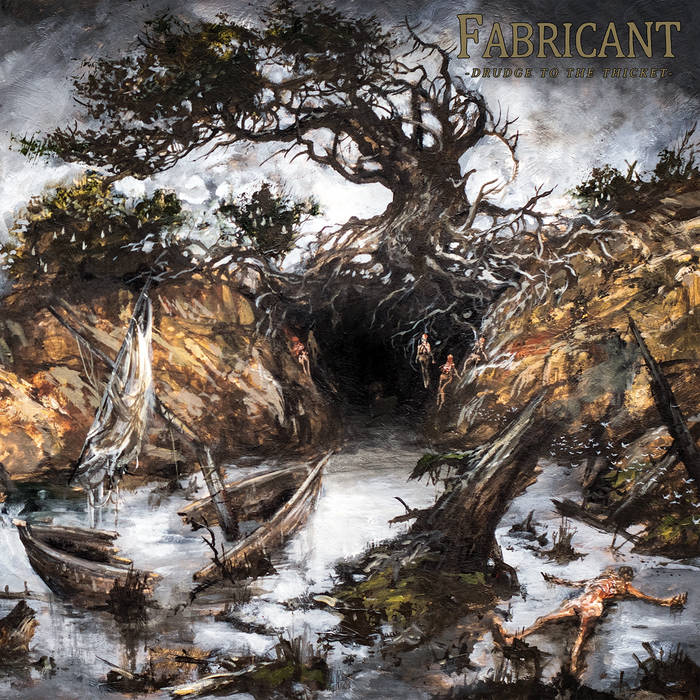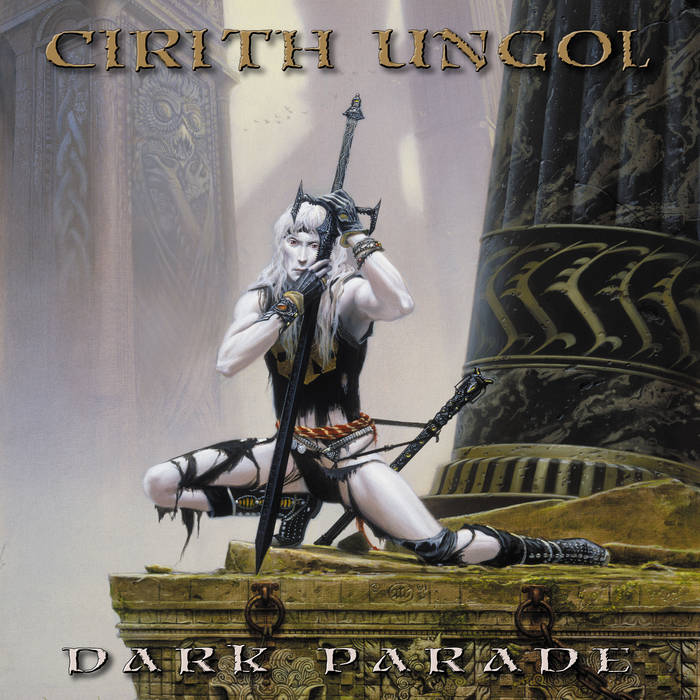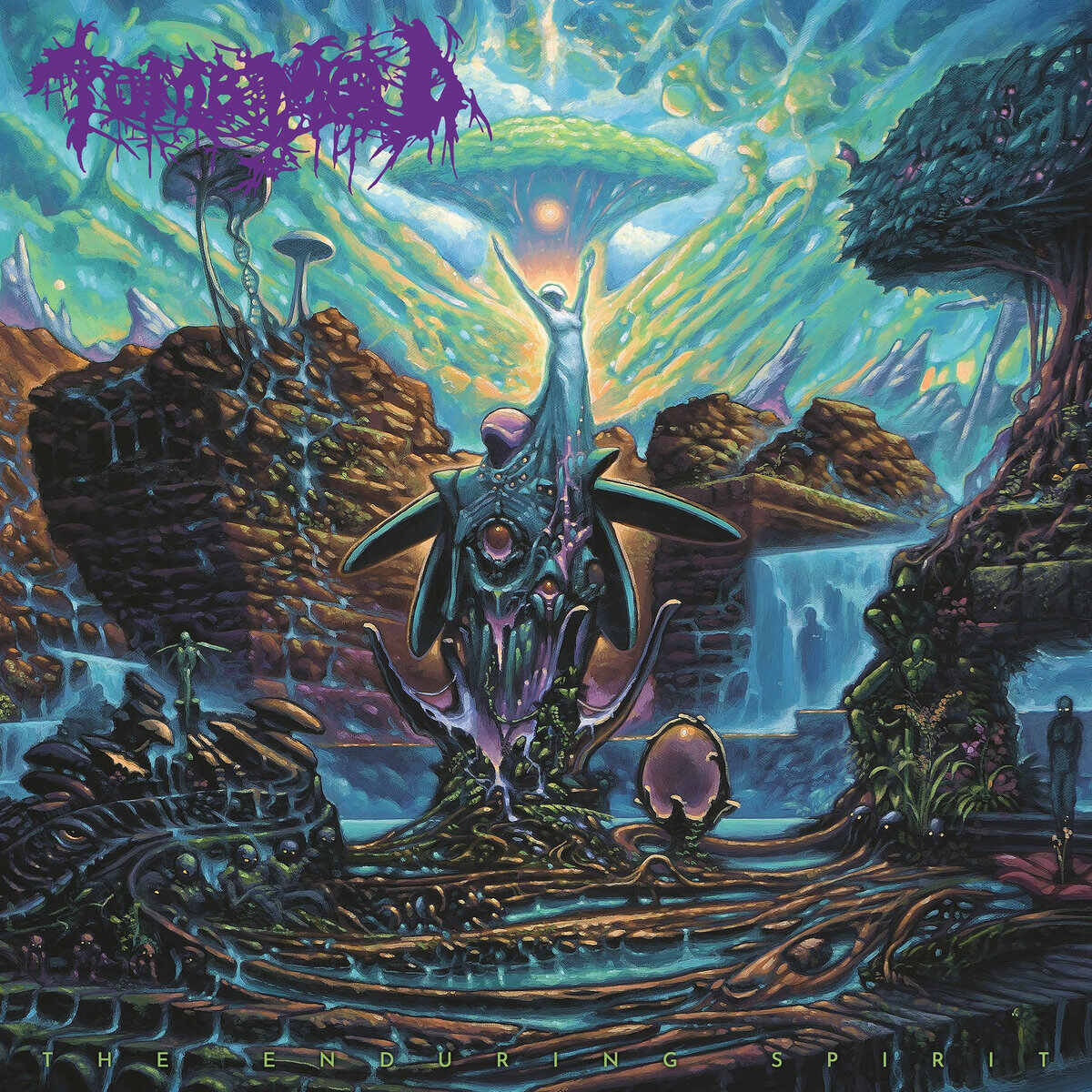
2023 has been one of the best years for metal in recent years. Particularly death metal, my drug of choice, has had a stellar year, leaving simply too many albums that any one blog could hope to cover. Yet, I didn’t have all that much trouble to form this list. While there were many things I could have listed, what I wanted to put on this list had been clear rather early on. A lot of these albums have aspects to them that fascinate me beyond the music itself and give me things to think about. Metal is always more than just music, metal is also mythology and there are still stories being written in 2023.
While The Exuviae of Gods - Part 2 isn't quite as good as the first installment, Mournful Congregation remain a force in funeral doom. This EP is dense both emotionally and on a level of composition and probably the best funeral doom of 2023.
As much a practical joke as it is an album teaser, Sarmat telegraph that their nerdery extends to more than just metal. I hope to one day get a full album of Pokémon arrangements from them!
I had originally penned Anachronism for a spot on the list proper. The year usually starts slow, and in many years, Anachronism probably would have made it. Meanders relies on many tropes of avant-garde death metal and a lesser band making the same album would have probably led to me dismissing it early on, but the band manages to innovate on the formula in many very subtle ways that open up during re-listens. The reason Anachronism is better than the average disso shit is that they do the things they do not because of the ever-solidifying genre traditions but because is it the best way to express their own state of mind. It is only because better avant-garde death metal that goes down smoother released later in the year that the album had to be moved to the honorable mentions—not bad to cling on for so long.
Jarhead Fertilzer occupies a unique spot on my list, as I would have probably featured it on the main list if I had more time to sit with it. Carceral Warfare feels heavier and tighter than Product of my Environment and the implicit political messaging is a bit clearer. The urban grime that the band represents oozes through every part of the album, and even the things I liked ironically about the debut—like the overlong and awkwardly cut samples—see improvement, not requiring as much of a tongue-in-cheek attitude to appreciate. Still, I have to be honest with myself and question how much recency bias plays a part. I have played Carceral Warfare many, many times since release and while I do think it is the best deathgrind album of the year, I cannot quite judge how much staying power it will have.
As a musician myself, I get something out of a band just having fun. While this very argument often gets brought up in favor of mediocre thrash or problematic party metal bands, it wholeheartedly applies to a band like Nuclear Power Trio whose raw talent and brutishly satirical attitude allows them to surpass the status as a gimmick act. Allusions to classical music and 80s jazz fusion classics round out a package of pure fun that I thought I would put down at some point but never did. And admittedly, I like the ever so slightly edgy puns, as well.
Hold up, I know what you're thinking. While my status as an ironybro precedes itself, I would not waste an honorable mention spot just to make an ironic joke statement. Otakuslam♡Animecide is peak irony, but it is also a fantastic slam album in its own right. Lyrically based on an anime I have not seen ((he keeps saying this...), the album heavily quotes from said anime musically, as well. Just from understanding the sound of anime scores, you know that the band nails their concept. Dehumanizing Itatrain Worship are the sound of dismembering your 2D girlfriends, and they do it with varied, creative riffcraft. When a joke band commits to a joke to the degree that they quote their wholesomely sarcastic interlude in their songs proper, you know this is a must listen slam album.
Oh, the pain I feel when I have to find new ways to describe how Autopsy are great despite doing the very same thing yet again is immeasurable. But I would be dishonest to myself if I didn't admit that Autopsy are just the best of the old guard that are still active. Their unique style of death doom, which always takes excursions into death 'n' roll and death doom without ever totally becoming those genres, has so much authentic slime. Autopsy love what they do, and they will always be the uncrowned kings of smutty, groovy, B-movie style death metal.
Black metal is peculiar. Among the extreme metal genres, it seems to have the biggest mainstream following, which is ironic considering how a lot of it prides itself on kvltness and underproduced music. In practice black metal has very little of an identity—a black metal album can sound like anything, and it will still be considered black metal even if practitioners chisel away most of its genre-identifying elements. Vertumnus Caesar is, maybe excluding some select few minutes, not a black metal album. Malokarpatan sound closer to Budgie playing Aphrodite's Child but with Kronos at the helm than they do sound like a classic black metal band. For the first time, it actually fucking works, too. In the past, production woes and lazy abrupt transitions had made Malokarpatan albums feel like poorly thought out collages, but Vertumnus Caesar goes down smoothly and cleanly. As warm analog synths creep in more and more, the only reminder that Vertumnus Caeser has extreme metal leanings are the raspy growls. The songs oscillate between tight, leather pants-wearing trad metal riffs and loose prog sections. Through sheer force of variety, we get a journey, bolstering the overall sound if it leaving the album rather back-loaded. As I often say, the best way of making a black metal album is to not make a black metal album. It seems Malokarpatan understand this as well.
I struggled with Finitude. Stortregn's last release, Impermanence, was a sleeper hit for me, ultimately worming its way into my top spot for 2021. The album impressed me with its neoclassical approach to structure and theming without ever digging into any of the horrible tropes that usually come with it. Finitude is not like that. Finitude is closer to how many technical and progressive death metal bands typically write their albums. Songs are still long epics and capable of suggesting a narrative beyond the lyrics and in the riffs, but they are more linear, at times even appearing as collages. Stortregn doesn't develop themes as they used to, instead building the narrative in the songs on individual set pieces—impressive sections that are memorable, but lack a cumulative build. Yet, despite this flaw which left me initially dismissing this new work, it grew on me over time. Its highlights might appear as surface level tricks, but ultimately serve a musical narrative, though I couldn't describe to you exactly what the album is about on a narrative level. Nonetheless, the emotional arcs remain clear despite the more linear approach. Stortregn continues to impress in that they can reach a similar level of emotional narrative through a different songwriting approach. Other bands often lose the plot in this manner that many metalheads would consider self-indulgent or too wanky. Stortregn's proves they are one of the best active bands right now.
If you asked me ten years ago whether Western black metal could be a thing, I would have dismissed the thought. Again, though, black metal is a blank slate onto which you can force any shape and sound you want. Wayfarer have long cared more about the twang and the open string hammer on riffs than they do about tremolo and blast beats, and that suits their sound very well. American Gothic lands less warm, less energetic than 2020's A Romance with Violence. The gothic americana (all puns intended) that creeps into the already atmospheric Wayfarer sound fits like a glove and gives a more dangerous identity to the wild west aesthetic. At this point, Wayfarer acts like a post/folk metal band, writing their material to be evocative of the space by understanding the musical tropes of Western and American country music. There just isn't much out there that sounds like Wayfarer right now, and while it occasionally runs the risk of turning into furniture music, I revisit it often because I simply enjoy occupying the same space as these Colorado cowboys.
On an purely objective level, I could describe what Neurectomy does and you would not be able to tell if the review was positive or negative. Neurectomy is, in a way, pure wank. The band push weedly, immensely complex material that many would consider to be too indulgent. Indulgence can either be fun or annoying, and in a way, it depends on how consensual and how tongue-in-cheek the material is. Neurectomy imbue their masturbatory fretboard abuse with just enough humor and awareness of tech death's absurdity that Overwrought never veers into being annoying. There is a method to the madness. When the band turns on a dime or seemingly switches from vastly different time signatures, speeds or grooves at random, there is an awareness of the listeners expectation. The band has confirmed to me on Facebook that one of their main inspirations is the ever-underrated Cephalic Carnage, a band who similarly understood that the arms race of technicality and speed that engrosses metaldom is a silly endeavor. I love a band that can embrace this spirit in this miserable time of ours—that can just simply enjoy how absurd the music we listen to really is.
So often do I hear people claim that an album is the heaviest thing ever, the most brutal thing under the sun. Then, when I end up checking it out, it's the usual fare—some random deathcore album with one note breakdowns and often an admittedly talented vocalist. Good vocals and superficial heaviness are not enough to make me overlook lazy, trope-laden writing when ultimately the only thing stopping you from getting Lorna Shore's exact guitar tone is a trip to ThePirateBay. True brutality is not only rare, but I believe most people are still put off by it. Nithing delivers just that though, pure brutality. The material is so dense that on initial listens, some of the more out-there production choices aren't even noticeable. Though in the foggy background, leads land deliberately de-tuned or harmonized in odd ways, and jangly, trebly chord stabs ring heavily with delay. Noticing this requires being desensitized to brutal death metal to a degree, and Agonal Hymns is as far away from being an entry level brutal death metal album. When a commitment to sonic violence and percussive barbarity becomes so strong, the album will approach the avant-garde. Nithing might be the most violent album of 2023, and I am grateful Agonal Hymns is only 26 minutes long.
Long time readers of the blog will know how much I like Demilich but they should also know that I can be critical of bands who rip my favorite bands off wholesale. The best examples of a “worship” band, those bands who focus on imitating a band's style and writing new material in that very style, are those who fail at it in interesting ways. Fabricant goes a step further and, in a way, sound like what Demilich might have sounded if they never called it quits... and if the innovations of later death metal didn't completely pass them. In addition to the skronky, odd grooves of a Demilich tune, Fabricant holds too a brutal death metal influence, all while pushing deeper into the avant-garde by using dry, post metal seeming leads and an abstract approach to melody. Frankly, it is very hard for me to not feature a death metal band with slap bass—Fabricant know that Demilich have always been funkateers at heart. There are clever variations on the sound on every track (like mangled, techy leads that sound passed through an old radio filter) or an unexpected shifts in style (in this case, songs that feel more straightforward and groove oriented). Drudge to the Thicket is a joy to explore and revisit and at the same time is immensely tight on a performance level—absolute Scuttlebait.
In my original review, I waxed philosophically about how the internet has been a god-send for the bands that time forgot. Cirith Ungol finally have enough of a following to get the production that they deserve. An odd little gem, with strange vocals and an at times outdated approach to songwriting even in the 80s, Cirith Ungol have always been more than the sum of their parts. The odd, goblin-esque vocals are an acquired taste at first, but seem like hardened battle screeches once you get acquired to them, retelling epic tales of fantasy. Simple riffs become vehicles for gritty tales of swords and sandals. The band feels epic in an effortless way. While I disdain European power metal for all the schmaltz and cheese that diminishes the epic feel, Cirith Ungol and the American power metal scene never had that issue for me. I like fantasy when it is just a little pulpy with an edge that has some kinks in it. I like some of it ironically, but irony is not dishonest. The cheese, the dirt, and the kick-ass traditional riffs that Cirith Ungol serves are exactly that. The band loves what they're doing and are unwavering in their approach. When they do commit to a song of epic length, you can be sure that it means something, like the eight-minute album highlight "Sailor on the Seas of Fate," which may be my favorite song of the year.
Relaxing death metal. This oxymoronic genre descriptor sometimes appears in this new wave of often progressive death metal that isn't all that obsessed with sounding evil, dark, or even heavy at all times. Often, this unfortunately leads to the material being either banal or wholly leaving the realm of death metal. True innovation used to be rare in death metal until recently because of that. The language of death metal had been so defined that doing something new with death metal seemed impossible. On The Enduring Spirit, Tomb Mold manage this tightrope. Extended chord harmonies and an increased sense of a more palpable approach to melody broaden the horizons of a band that had always played more creatively than their peers. It would all crash and burn if Tomb Mold weren't so smooth in melding these new elements with their original style. The Enduring Spirit is far removed from the twangy, Finnish style death metal that opened their career, and while the development is surprising, it always feels logical and committed. I have always said that Tomb Mold needed to take some time and really develop an idea, and that a slowing down of the release schedule would be beneficial. The first time the band skipped a release year, they deliver a milestone album such as this—seems my instinct was correct.
While I ultimately didn't put Sarmat in my top spot, they feel like the big winner of 2023. Their 2023 EP, Dubious Disk, already topped my EP mentions. The follow-up full-length is amazing as well, albeit in a different way—much less of a practical joke. Seldom has the inventiveness of the New York jazz scene been melded with metal so seamlessly and to such great effect. Determined to Strike showcases both one of the most unique jazz scenes and one of the most unique extreme metal scenes in the USA, all while finding common ground between the two. Skronky brass meets finnicky guitar work, tense dissonant piano meets the lowest of tunnel throats, and none of that ever clashes in a negative way. Where many bands take two styles and try to derive value from the contrast, Determined to Strike's main thesis statement seems to be that the two styles are not dissimilar. When a genre gets pushed to its extremes in the pursuit of exploring even the latest nooks and crannies of what the genre has to offer, it will discover dissonance, harshness, chaos, willing to go outside the well-trodden path away from Flanderization of genre tropes. That Sarmat overcomes all of my issues with modern avant-garde extreme metal is no easy feat. But to do so with a subtle sense of humor is an even bigger achievement.
I often criticize albums for being too sappy. Hitting true, honest emotions in musical form is rare. Too much of music's vocabulary has been tainted by melodrama, leaving everything that was once effective as useless. Slumbering Sun has found the right balance. It is rare that a band is sad in the way that I am sad and is able to express it. The Ever-Living Fire is the one album this year that gave me an emotional release, the only one that brought catharsis. Frankly, most years have no album like this. The traditional Doom elements are enriched with gentle chords borrowed from post and progressive rock. The singer sounds like Ozzy, if Ozzy was an actually good singer, and he is capable of building long, melodic arcs. Slumbering Sun aren't exactly catchy—the album isn't hugely centered on choruses or vocal hooks—but it is certainly memorable. In a way, I remember how the album feels. Through all the doom, the long song structures, gentle intros and the through the warm, gentle but purposeful production shimmers hope that, if we continue to fight, we can make it through. The album ends on a choir of “Na Na Na’s”, a musical device that is hard to take seriously in a normal context. The section seems almost childish, like an ad for a children's charity. Most albums, let alone metal albums, would not be able to earn a moment so unironically cheery and hopeful. But The Ever-Living Fire can.
